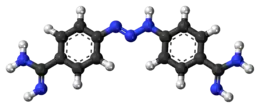 | |
 | |
| Clinical data | |
|---|---|
| Trade names | Azidin, Berenil, Ganasag, Pirocide |
| Other names | 4,4'-(1-Triazene-1,3-diyl)bis(benzenecarboximidamide) |
| Routes of administration | IM, SC |
| ATCvet code | |
| Legal status | |
| Legal status |
|
| Identifiers | |
| |
| CAS Number | |
| PubChem CID | |
| ChemSpider | |
| UNII | |
| ChEBI | |
| ChEMBL | |
| CompTox Dashboard (EPA) | |
| ECHA InfoCard | 100.007.860 |
| Chemical and physical data | |
| Formula | C14H15N7 |
| Molar mass | 281.323 g·mol−1 |
| 3D model (JSmol) | |
| |
| |
Diminazene (INN; also known as diminazen) is an anti-infective medication for animals that is sold under a variety of brand names. It is effective against certain protozoa such as Babesia, Trypanosoma, and Cytauxzoon. The drug may also be effective against certain bacteria including Brucella and Streptococcus.[1][2]
Chemically it is a di-amidine and it is formulated as its aceturate salt, diminazene aceturate.
The mechanism is not well understood; it probably inhibits DNA replication,[1] but also has affinity to RNA.
Side effects
Acute side effects include vomiting, diarrhea, and hypotension (low blood pressure). Diminazen can harm the liver, kidneys and brain, which is potentially life-threatening; camels are especially susceptible to these effects.[1]
Resistance
The Gibe River Valley in southwest Ethiopia showed universal resistance between July 1989 and February 1993.[3] This likely indicates a permanent loss of function in this area against the tested target, T. congolense isolated from Boran cattle.[3]
References
- 1 2 3 Peregrine AS, Mamman M (September 1993). "Pharmacology of diminazene: a review". Acta Tropica. 54 (3–4): 185–203. doi:10.1016/0001-706X(93)90092-P. PMID 7902657.
- ↑ Mungube EO, Vitouley HS, Allegye-Cudjoe E, Diall O, Boucoum Z, Diarra B, et al. (August 2012). "Detection of multiple drug-resistant Trypanosoma congolense populations in village cattle of south-east Mali". Parasites & Vectors. 5: 155. doi:10.1186/1756-3305-5-155. PMC 3432589. PMID 22852796.
- 1 2 Mulugeta W, Wilkes J, Mulatu W, Majiwa PA, Masake R, Peregrine AS (April 1997). "Long-term occurrence of Trypanosoma congolense resistant to diminazene, isometamidium and homidium in cattle at Ghibe, Ethiopia". Acta Tropica. Elsevier BV. 64 (3–4): 205–217. doi:10.1016/s0001-706x(96)00645-6. PMID 9107367. S2CID 23878484.